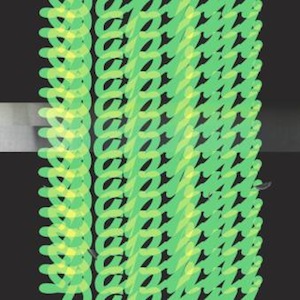Release Date: October 09, 2012
Label: Merge
“Retro” is easy. In dance music, producers with the right sample packs and presets — and DJs with the right records — can all do it, and then do it, and do it some more. The last half-decade has given rise to the genre’s first major assertion of its throwback impulse; oddly, it’s stadium EDM that’s doing the most blatantly futurismo stuff, twisting dubstep’s low end every goddamn way. At first, it was a jolt to hear a Trax classic suddenly dropped into a podcast set of otherwise London-bass-y stuff, or serve as punctuation amid a slate of newer house jams. But “new” tracks that directly evoke late-’80s Chicago house have become a go-to subset of the current dance scene — tipping point: Steve Bug’s early-2011 “Jack Is Back” — and that’s just one example: Another is the predominance of screwed-and-chopped ’80s R&B in the wake of James Ferraro’s FACT Mix last year.
The joyous Jiaolong — credited to Daphni, a.k.a. Dan Snaith of Caribou, initially ventures out in what seems like similarly retro territory, via the sampled soul vocals and horns of album opener “Yes, I Know,” which have the giddily choppy quality of vintage Todd Terry. But while other possible sonic antecedents abound, the full album feels more roots than retro, old tools reclaimed to new ends. “Springs” has some of the utterly freaky minimalism of early-’90s second-wave Chicago house, but sounds equally like a mutation of early Warp bleep & bass. “Ye Ye” chugs à la mid-’90s trance (when it was more machine than melancholy), but feels like a lovingly blocky, more homemade version. And a simple keyboard hook at the center of “Pairs” stays grabby thanks to the sheer variety of echoes and mutations Snaith devises from it, some reoccurring throughout, some only making brief cameos. (The best iteration comes in for a few bars at 4:33 — so computer-buzzy it seems somehow translucent.)
Throughout, Snaith features a home-built modular synthesizer at the center of his heavily electronic palette rather than the instrumental richness of his last three albums, 2006’s breakthrough Up in Flames (as Manitoba), or 2007’s hippie-blissful Andorra and 2010’s deeply glossolalic Swim (both as Caribou). The resulting innovations include the heavily treated whistles that form the hypnotic backdrop of “Ahora,” an effect that’d probably creep everybody out if the beat weren’t so lively. There aren’t many homages to jackin’ Chicago menace you can say that about.




